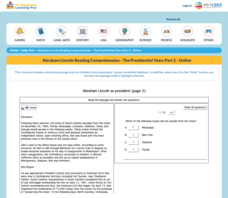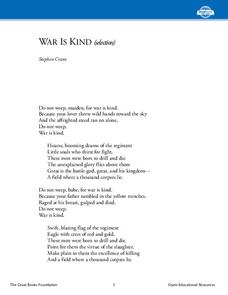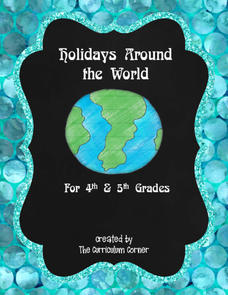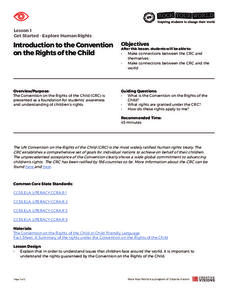National Park Service
A Tale of Two Men
Theodore Roosevelt and the Marquis de Mores were both born in 1858, and both came to the Dakota territory in 1883, but they influenced the developing country of America in different ways. Elementary and middle schoolers apply written and...
Mr. Nussbaum
Abraham Lincoln Reading Comprehension—The Presidential Years (Part 2)
How does a president save a country from itself? Readers learn how the Civil War began and how Lincoln managed it with a reading comprehension passage. They then demonstrate their understanding with multiple choice questions that...
101 Questions
Foreign Subway Order
Subway orders are the same in every language, right? An inquiry-based lesson presents a Subway ordering board from an Asian country. Given an order, learners must determine the cost by comparing symbols of the order to the symbols on the...
Macmillan Education
Slang
A four-part worksheet challenges scholars' knowledge of American, Australian, and British slang. Learners use context clues to decide which country a slang word is from, complete sentences, decipher a conversation, and answer questions.
Smithsonian Institution
Cold War
The Cold War was not necessarily always cold in temperature, but the relationship between the United States and the Soviet Union sure was frigid! Scholars read various passages, view exhibition graphics, and observe an artifact from the...
Great Books Foundation
War Is Kind
Ponder the complexities of war, peace, and country with Stephen Crane's "War is Kind." After reading the poem, learners answer six questions in a class discussion or as an individual assessment.
Mascil Project
Chocolate Chip Mining
Canada mines more minerals than any other country in the world. Scholars with a sample must determine how to get the mineral out while preserving as much of the rock as possible. They analyze the data and compare methodology while...
The Alamo
A Lesson in Citizenship
What does it mean to be an American citizen? Lieutenant Colonel Commander William Barret Travis believed that it meant honor to country first—even above one's own life. Middle and high schoolers read his final letters from the Alamo that...
Reading Through History
The Leadership of George Washington
Why did Americans choose George Washington as their first president? After reading the resource, pupils discover why citizens trusted him to lead the country. They learn about his time as a military leader, as well as his actions after...
Curriculum Corner
Holidays Around the World
Celebrate traditions and cultures around the world with a set of worksheets and printables. Fourth and fifth graders can create booklets or simply participate in individual studies of specific holidays in different countries. From lined...
Council for Economic Education
Economic Data Lesson: Economic Policy Options
Can you make decisions that will impact millions of people around the nation? Scholars research the role of the Federal Reserve, and its Chairman, on the economic outlook of the country. They analyze current trends in unemployment,...
A&E Television
Thomas Jefferson: Teachers Guides
Thomas Jefferson remains one of the most fascinating figure in American history, both for his innovative contributions to the United States government and his remarkably contradictory personal life. A series of discussion questions and...
Creative Visions Foundation
Introduction to the Convention on the Rights of the Child
The UN Conventions on the Rights of the Child (CRC) has been ratified by 196 countries so far ... and still counting! Using the first of two lessons covering the Introduction to the Convention on the Rights of the Child, scholars learn...
Serendip
Vitamins and Health – Why Experts Disagree
Should people take vitamins or get the needed minerals through diet? Experts disagree based on many different factors. Scholars compare study findings and discuss the differences. They learn the importance of comparing results across...
College Board
2005 AP® Human Geography Free-Response Questions
Why do people leave their home countries and come to the United States? How has nationalism affected European nations politically and socially? The answers are complicated. Pupils explore the intricate dynamics using structured questions...
College Board
2008 AP® Human Geography Free-Response Questions
Interpreting demographics is no easy task. From the reason more girls go to school around the world to why people move within their own countries, the issues are complex. Short-answer prompts help learners unravel the questions as well...
College Board
2011 AP® Human Geography Free-Response Questions
How have Mexico's largest cities help shape the destiny of that country? What insights can a ninteenth-century economist give us about population growth? Two essay-style questions help your learners unravel complicated relationships....
College Board
2015 AP® Human Geography Free-Response Questions
How are population and political power related? What is the significance of the globalization of English? Why do refugees leave their home countries? Using structured short-answer questions, scholars unravel complicated dynamics with...
College Board
2012 AP® Human Geography Free-Response Questions
Why do countries create boundaries? Scholars explore similar ideas using prompts from the 2012 AP Human Geography test. Pupils also test their acumen with questions on agriculture and the growth of Islam.
Perfection Learning
In The Year of the Boar and Jackie Robinson - Activity Book
Moving to a new country isn't easy, as Shirley Temple Wong learns in In The Year of the Boar and Jackie Robinson by Bette Bao Lord. A series of language arts activities carry readers through the novel, addressing the story's themes,...
College Board
1999 AP® Macroeconomics Free-Response Questions
Gross domestic product can be a telling indicator about the health of a country, but it has limitations. Learners examine common indicators using structured prompts and problem sets from the College Board. Other practice problems include...
College Board
2010 AP® English Language and Composition Free-Response Questions Form B
Although the United States observes Daylight Savings Time, many countries decided against it. A free-response question, part of a set of sample questions from the 2010 AP® English Language and Composition exam, has writers consider the...
College Board
2003 AP® Macroeconomics Free-Response Questions Form B
Learners consider production possibilities using an authentic test question from College Board. Other questions include practicing supply and demand curves and examining the effects of inflation, employment, and other variables on a...
College Board
2005 AP® Macroeconomics Free-Response Questions Form B
Suppose a country increases its budget deficit. How would such an increase affect businesses and the exchange rate? Learners consider what happens and ponder other questions from College Board that look at employment, supply and demand,...
Other popular searches
- Spanish Speaking Countries
- Francophone Countries
- Continents and Countries
- African Countries
- Spanish Countries
- Third World Countries
- Countries in Europe
- Countries of the World
- European Countries
- Middle East Countries
- Comparing Countries
- Compare and Contrast Countries

























